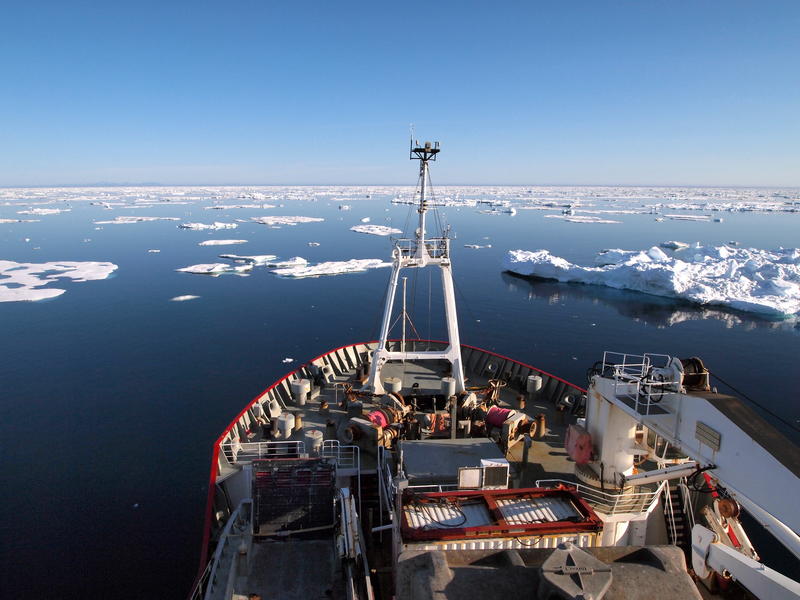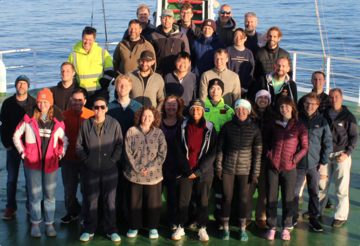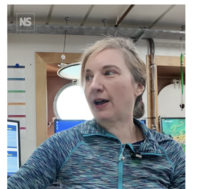Biological Oceanography
Research Group

Phytoplankton are key players in both the ecological and biogeochemical functioning of aquatic ecosystems. Their rapid growth rates and planktonic mode of life makes these microscopic algae excellent sentinels of environmental change. The focus of our research is to develop a deeper understanding of how marine phytoplankton are responding to changes in environmental forcing over a variety of spatial and temporal scales.
You can find out more about current and past projects by clicking on the green tabs below.
Phytoplankton Macroecology and the Ocean Carbon Cycle

To determine how changes in the large-scale distribution of marine phytoplankton impacts the ability of our oceans to absorb carbon requires combining conventional ship-based observations with state-of-the-art observational platforms, such as earth orbiting satellites, autonomous underwater vehicles and floats. This requires working with national and international collaborators spanning a range of disciplines. We have participated in oceanographic campaigns from pole to pole to improve our understanding of the major drivers governing the productivity and diversity of marine phytoplankton that will allow us to better predict how they may respond to future change.
People
Current Projects
Funded by the European Space Agency (ESA), Combining a Stochastic LAgrangian Model of Marine Particles with ESA’s Big Data to Understand the Effects of a ChaNging Ocean on the PlanKtonic Food Web (SLAM-DUNK) is a project awarded to our lab’s member Dr. Anna Rufas through ESA’s Living Planet Fellowship. This project combines ESA’s state-of-the-art satellite data products of the global surface ocean carbon cycle with a novel model of stochastic Lagrangian marine particles to understand the mechanistic controls that affect the ocean’s biological carbon pump transfer efficiency.

As one of the three funded projects under the NERC Bio-Carbon Programme, Integrating Drivers of Atlantic Productivity (IDAPro) will combine state-of the-art observations from in situ and satellite sensors with ship-based experiments to increase our confidence in predicting future change in marine productivity.

The Satellite-based observations of Carbon in the Ocean: Pools, fluxes and Exchanges (SCOPE) project aims to provide the best possible characterisation of the ocean carbon budget from satellite observations and further the understanding of its variability in space and time. It will produce satellite-based products and uncertainties of the pools (phytoplankton carbon, particulate organic carbon, dissolved organic carbon, particulate inorganic carbon and dissolved inorganic carbon) and fluxes (primary production, export production, air-sea exchange and land-sea exchange) of the ocean carbon cycle using the 25-year time series of Ocean-Colour Climate Change Initiative.

The CO2 storage in and beneath our shelf seas 'Sprint' project is part of the AGILE Initiative funded by the NERC ‘Changing the Environment’ programme and hosted at the Oxford Martin School. The overarching aim of the Sprint is to develop a framework for environmental impact assessment for sub-sea CO2 storage in offshore reservoirs. The framework will optimise the tension between the CO2 storage capacity versus the risk of CO2 leakage and additional carbon loss through disruption of carbon currently stored in the ecosystem, termed “blue carbon”.
Past Projects

The Monitoring Ocean Ecosystems project funded by the Oxford Martin Programme aims to develop and undertake preliminary field-testing of a protype low-cost sensor that will continuously count and classify oceanic phytoplankton and the calcium carbonate shells they produce.

Funded by the Role of the Southern Ocean in the Earth System (RoSES) Programme, Carbon Uptake and Seasonal Traits in Antarctic Remineralisation Depth (CUSTARD) examines the impact of seasonal availability of nutrients on the type and health of the local phytoplankton, both of which change the depth to which the carbon penetrates.

Biological Pump and Carbon Exchange Processes (BICEP) is an ESA funded Consortium of 12 international institutes that synthesised the current state of knowledge of the ocean biological pump using in situ datasets, consolidated a set of scientific requirements for remote sensing products, and conducted a satellite-based analyses that will be placed in the context of carbon cycling in other domains of the Earth System.

NERC Changing Arctic Ocean (CAO) Programme. Oxford led the Phytoplankton Primary Production Work Package of Arctic Prize, which examined the photosynthetic response of Arctic phytoplankton communities to seasonal changes in environmental forcing in order to improve our understanding of the ecological and biogeochemical consequences of Arctic sea-ice loss. Our team participated in four research cruises in the Barents Sea.

As part of the UK contribution to the International GEOTRACES Programme, we used a combination of in situ measurements, ship-board incubation experiments and satellite observations to examine the role of trace metal limitation in the South Atlantic over the 40ºS Atlantic transect, a region of strong nutrient gradients, providing a unique opportunity to test the relationship between Fe supply, taxonomic response, and phytoplankton fluorescence properties.
Publications
NEWS
Onboard the RRS James Cook: Unlocking the role of marine life in ocean carbon storage
In September 2024, we sailed along with the rest of the JC269 science party on the RRS James Cook. This video highlights the main scientific objectives of the cruise and how we use ships, satellites and autonomy to better understand the fate of carbon in the subpolar North Atlantic.
Click here to see the YouTube Clip!

New Scientist Video Story: Why ocean scientists measure chlorophyll data from satellites

Heather talks to Oxford DPhil student Arianwen Herbert aboard the
RRS James Cook about her research on converting satellite maps of
phytoplankton chlorophyll into large-scale estimates of marine
primary production. This work was conducted in collaboration with
colleagues across the UK as part of the IDAPro project.
Click here to see the YouTube clip!




